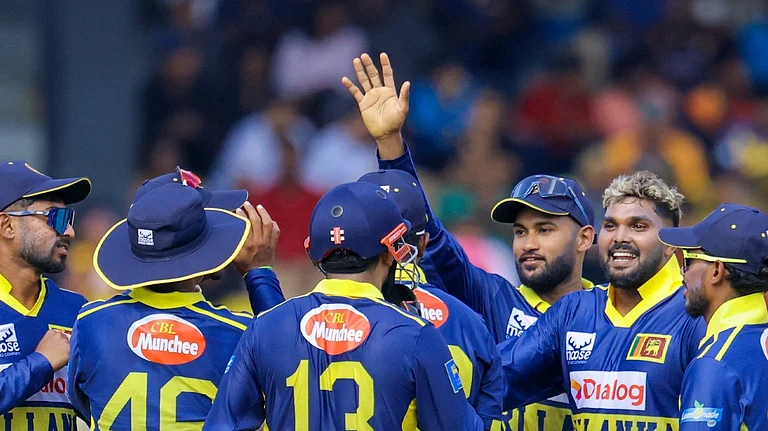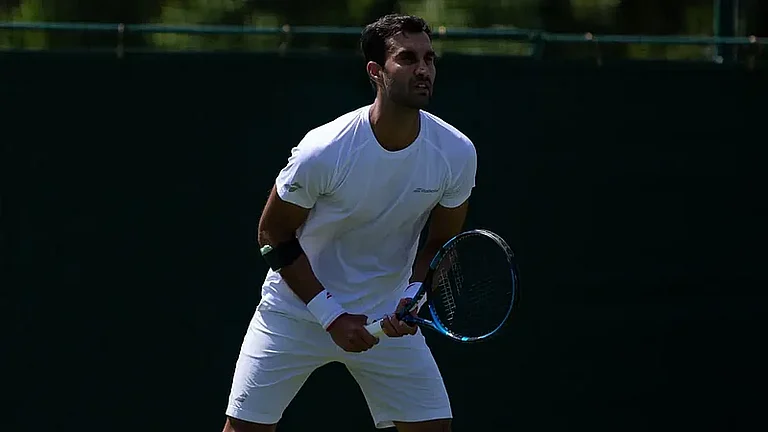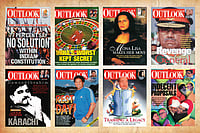Badian, papad, chole kha ke
Ban gaye ye balwaan
Dekhoji, dekho, mitti ke pahalwan.
(They feed off papads and nutri-nuggets
They think they are tough nuts
Oh just look at these weak little mutts.)
WHEN that Pakistani propagandist ditty hummed across the airwaves and into Indian homes during the 1971 war, there weren't many Indians who disagreed with its basic premise. Namely: meat equals muscle. No longer. Today innumerable urban Indians of diverse ages, castes and communities would contest that contention. Indians who find less merit in meat and both vigour and virtue in vegetarianism.
Like Delhi-based Vasant Valley school student, Aditya Roy, 9, who shocked his beef-chewing, fish fond parents when he pushed away the pepperoni pizza he'd always tucked into with great relish. "Don't want meat," he mumbled. "It's cruel to eat animals". Six months on he's remained resolute, spurned the family's attempts to feed him mutton cutlets masquerading as potato croquettes and continues to favour tinda over tandoori chicken at meal times.
And Ilham Iqbal, 27, Bombay-based film director assistant, member of a 'mutton five days a week' family, who has stuck to her decision to turn vegetarian, taken six years ago. This, despite the dismay of family, the derision of relatives who sneered "...must be in love with a Hindu boy" and often 'forgot' to cook vegetables at family dinners. Undeterred, she's stuck to her ghas phoos and her gut instinct "which is vegetarian," she says quietly. "I understand life eats life, but you have to draw the line somewhere."
Or, even Amrit Kaur Kent, 65, Delhiite, upper-crust epicure Sikh, vegetarian for nine years now. "It was an ISKCON article that decided me. It said if we were meant to be carnivores we wouldn't have the teeth and digestive systems of herbivores." For her it was a health issue too. "Red meat pushes up uric acid counts, aggravates arthritis. Meat is tough to digest at my age."
Or Mukul Dev, 25, model, budding actor who turned vegetarian a year ago for reasons of both health and hubris. "Fruits and vegetables provide energy, are rich in dietary fibre and anti-oxidants that keep the face young. My diet keeps fat and muscle ratio in control, keeps me full rather than fat. Important in my line."
Roy and Iqbal, Kent and Dev: no whimsical oddities these, but part of a small but growing tribe of urban Indian vegetarians. Some converts, others born-again herbivores. Votaries of a trend that cuts across age, gender, region, religion. The phenomenon of a segment of Indians, neither Brahmin nor Bohemian, rediscovering the virtues of vegetarianism in a nation comprising communities, a staggering 88 per cent of whom are non-vegetarians (cf The Life of the People of India, published by the Anthropological Survey of India, 1993) is a significant indicator of a sea change in attitude. No faddists these. Rather, in a media-swept environment growing frantic by the day, these are people seeking a pause to make the right choices, gain some control over their lives: smoke-free environments, rationed or no television, value-rich vegetarianism are the expressions of precisely this phenomenon. For the way we eat is indicative of the way we think, feel, live. Of the way we're evolving. For the comment it offers on the prevailing ethos.
But analysis has to necessarily wait upon the event. Are a signifi-cant number of Indians actually electing to turn veg? Definitive studies are hard to come by, but feedback from doctors, dieticians, hoteliers, airline caterers, cookbook writers and publishers seems to suggest so. Dr Sameer Kaul, surgical oncologist at Delhi's Batra Hospital, is constantly surprised at the number of people he meets who've turned vegetarian of their own volition rather than under medical advice. "Levels of awareness about current medical wisdom that says proper nutrition is not synonymous with non-veg food, are high," he reveals. Shiela Nelson Kuttaiya, dietician at Bangalore's Wockhardt Hospital and Heart Institute, agrees. "More peo-ple are realising that good nutrition is about a balanced rather than a non-veg diet". Rashmi Malhotra, dietician at Delhi's Curls and Curves Health Club, finds a number of her clients—teenagers, professionals, housewives from murgh mussalam households—turning vegetarian by choice. "They're informed eaters for whom eating isn't about hunger or taste but proteins and carbohydrates." Teena Sharma, manager, Reebok Fitness Center, Delhi, discovered many of her fitness freak clients were vegetarians. "It's beginning to dawn on people that 'beef' doesn't necessarily translate into more 'beef'."
More definitive evidence comes from the hotel and airline catering industry. Sujata Mahapatra, F&B marketing executive at the Delhi Oberoi, has a burgeoning vegetarian clientele. "They account for 35 per cent of our banquet business. They're youngsters. Not Tuesday or Thursday vegetarians, Jain and Marwari business fortunes that were the mainstay of our vegetarian business five years ago." Ajay Vij, executive sous chef at the same hotel, provides corroborative statistics. "Vegetarian salads account for 60 per cent of our total salad sales at the lunch buffet." Restaurateurs, too, report more people are eating greener than before. Ritu Dalmia, 24, proprietor, Delhi's Mezza Luna eatery, and a born-again vegetarian, recently bowed to demands from her predominantly yuppie clientele to correct her 'meat-biased menu'. Prem Rapson, 19, proprietor of the neighbouring Sacred Earth Mexican food outlet, didn't wait for complaints. He revised his menu to reflect an even meat/leaf ratio when a random survey revealed 20 of the 48 clients, aged 20-45, who came to his eatery in a day were vegetarians. Haroon Sulaiman, owner of The Only Place, Bangalore, too, was compelled to revise his menu when he discovered at least three out of 10 people that came to his restaurant on any given day were vegetarians. Suresh Shah, proprietor, Dhawalgiri Restaurant, Surat, proved smarter when he settled for an all-vegetarian menu at the outlet he opened six years ago. Of the 100-odd clients he caters to daily, a majority are visiting out-of-towners, businessmen who are vegetarians by choice rather than compulsion or birth. "It's a bigger market than I thought," he purrs.
Obviously, there's rupees in them radishes. And the restaurateurs' astute menu shifts reflect that. Brothers, Ranjan and Sanjay Agarwal, owners, Delhi's Salad Chef chain, profited immensely from introducing an extensive vegetarian salad menu at their three outlets. Revenues from vegetarian salads in '93, their debut year: Rs 3 lakh. Turnover in '96: Rs 27 lakh. Raw material for those salads and salsas, whether at Salad Chef or elsewhere, comes from farmers who've made fortunes catering to the fad. Like Delhi-based Madhu Kohli, 51, owner of Madhu Farms, one of the biggest suppliers of exotic vegetables in the city. Figures she will not reveal. What she does reveal is significant. "Business hasn't grown as much in 30 years as it has in the last five years." Dehra Dun-based Vimal Gupta, 32, of Ferracon Farms that supplies exotic vegetable produce to five-star eateries in Delhi and Bombay, is more forthcoming. "We began in '93 with nine acres, farmed only broccoli, lost Rs 15 lakh in the first year. Three years on, we've acquired 12 more acres, are growing 15 varieties of vegetables and importing two greenhouses from Israel." Total investment '93: Rs 40,000. Total investment '96: Rs 40 lakh. No turnovers are divulged, but his investment figures speak volumes.
Figures from the airline catering industry confirm the Eat Green trend. Indian Airlines recently floated a subsidiary, Alliance Airways, that serves only vegetarian food. Sudhir Pande, executive chef, Oberoi Flight Kitchen at Bombay, feels vegetarianism is a global trend whose Indian adherents are growing. "On the British Airways economy class alone, the ratio of vegetarians to non-veggies is 60:40 as opposed to 40:60 just three years ago." Significant, specially because 75 per cent of the passengers on BA's outbound flights are Indians, mostly Sikhs. Navin Aggarwal, F&B controller at Taj Air, caterers to Air India, Indian Airlines, Modiluft, East West and Jet Airways, says demand for vegetarian meals on domestic flights is shooting up. "Vegetarian orders used to constitute 35 per cent. Now they average almost 50 per cent on most sectors. And I'm not talking about the 'Jain' Ahmedabad sector."
Feedback from cookbook writers and publishers provides further proof of urban India's ongoing romance with 'life, liberty and the pursuit of vegetables'. Tarla Dalal's vegetarian cookbook, first published in '73, has gone into dizzy reprint every year since. Duly inspired, Delhi-based Pramod Kapoor, proprietor, Roli Books, has rushed proofs of two vegetarian cookery books to his printers for an October launch. His standard print order for his non-veg cookbooks: 12,000. Initial print order for these two books: 20,000. "I expect them to be fast movers. The market for vegetarian cookbooks has boomed in the last three years." Penguin and Rupa executives agree. Both publishing companies are flirting seriously with the idea of entering the vegetarian cookbook bazaar.
Clearly, a small but sizeable segment of urban Hindustanis are turning herbivorous. Why? The question doesn't admit an easy answer. Superficially, the phenomenon is reflective of the modern Indian's engagement with the concerns of the age: ecology, animal rights and wrongs, media generated awareness about the carcinogenic qualities of meat, the higher moral value of vigilante vegetarianism, non-violent Oshoism, new-fangled New Age-ism.
Awareness has spawned a swathe of vegetarians. Eco-veggies like Bharat Mansatta, 38, Bombay-based environmentalist who's vegetarian because to him "both economically and ecologically it makes more sense. Why grow feed for animals on land you could use to grow food for humans? Why have concentrations of livestock that exhale poisonous methane into the atmosphere?" Compassionate vegetarians like Delhi-based doctoral student Pragati Sahni, 27, who turned vegetarian six years ago, and Modern School student Pooja Jhalani, 17, who gave up meat nine months ago because they "didn't like the idea of eating death". Not unlike Madras-based lawyer and martial combat trainer T.M. Kumar, 32, a "born non-vegetarian" who eschewed meat four years ago because "I didn't see how I could claim to be sensitive to life and reconcile myself to the idea that someone was dying to 'meat' me. Today at least I can look an animal in the eye." Another vegetarian type: the considered carcinogenic-conscious one like golfer and pilot Manish Dutt, 26. "Meat contains toxins, excess saturated fats and is known to trigger colon cancer. Besides, can one really be sure about good hygiene in India? I prefer to be safe than sorry," he says explaining his decision to turn vegetarian two years ago.
But the new vegetarianism is not all about new-found ecological and medical concerns and rediscovered consciences. Indian citizens of the global village, travelling more than ever before, are aware of and influenced by the fads and food wisdom of the times. Times of organic and macrobiotic diets, fat-free fat, sugarless sugar, caffeine-less coffee, bacon-free bacon, Hildon plain and Hildon carbonated water cocktails. Even vegetarian shoes!
At another level, it mirrors the Indian's legendary obsession with phoren: the flirtation with and adoption of vegetarianism, today a trend abroad, is of a piece with our enthusiastic embrace and rediscovery of yoga, alternative medicine, Indian spirituality and sitars once they had the vital stamp of western approval. And then there's fashion value. Meat eating is no longer a la mode. Especially when glamorous doll-faced designers deliberately flog designer causes a la animal rights to grab media attention. The most recent example being the seductive Ritu Beri purring her concern at the plight of the very animals that she, till very recently, was happily feeding on, to promote something as trivial as her teddy bear T-shirt line! Beri is just one example of the new fashionable vegetarian votaries. There are innumerable others: actors Amitabh Bachchan, Akshay Kumar, Rekha, Veejay Ruby Bhatia, publisher Nari Hira, tittle and tattle specialist Shobha De ("I'm trying to," quoth she), fashion designer Geetanjali Kashyap to name a few. "There's seduction involved here. Mirroring. People like to cast themselves in the image of the idealised other. Many people would turn veg because Bachchan is," explains psychotherapist Ashok Nagpal.
There are other, complex, dimensions. "Through the '40s, even earlier, to the colonised Indian mind vegetarianism = 'effete' while meat = 'masculine'. The white master ate meat. The brown subject followed suit in a bid to retrieve his lost sense of 'masculine' self," points out socio-psychologist Ashish Nandy. That changed only marginally in the '50s and '60s during which smoking, drinking, eating meat, became the cornerstone of not 'masculinity,' but in a twisted sense, 'modernity'. The liberal badge of pride of the so-called 'progressive' Indian. That single gesture of eating meat signified a break from 'backward' Brahminism, an initiation into progressive bohemianism. Film archetypes of the period mirrored that: temple hopping ma and bade bhai (big brother) in desi drag, recoiling in horror at the sound of western music, the very mention ofbooze and beef represented the traditional Indian ideal. Chote bhai (little brother) in western suit, booze in one hand, fish fry on fork in the other provided the 'modern' counterpoint. Through the '70s and '80s meat-eating was not so much about rebelling as about revelling. In the good life. The defining pleasures and presiding deities of which were Butter Chicken 'n' Booze. Meat eating was an extension of affluence in those khao pio ji days of liberalisation, lolly generating sharemarkets, laden larders and supermarket shelves.
All that changed in the '90s. "The '90s are about Neo-Puritanism. Austere. No more '80s excesses. Feeding is out. Flaggelation is in. Ergo, vegetarianism," says fashion designer David Abraham, a diehard non-vegetarian who confesses he'd "die without meat". Key word: Austerity. Turning vegetarian for many evokes a sense of purge, even spiritual cleansing. "Somewhere you're slamming the brakes, directing the course of your palate, your praana," says Mallika Sarabhai, one-time chicken chewer turned vociferous veg-gie. Control is one, political correctness the other aspect of Indian vegetarianism. "It's in conformity with the whole non-violent, non-invasive, pro-choice Greenpeace ethic, the New Age 'you are what you eat' doctrine. A whole generation of Indians ignored this. What they ignored as fact, they now subscribe to as fashion. It's all to the good," quips dancer Justin McCarthy, 38, naturalised Indian and converted vegetarian. Moral shift? Yes. But nouveau vegetarianism is often about tres chic hypermaterial-ism. "This is the post-consumerist creature looking for noveau niched snobbery," says gourmet Jiggs Kalra. Underpinning: I'm rich enough to eat what I like. No lettuce. Only pink lettuce. No baingan. Only broccoli. Then there's the vegetarianism that's about Sex and Sensibility. In an age of Akshays, being veggie is 'sexy'. "It implies you're taking care of yourself," says model coordinator Asha Kochar. "There's allure in that."
As also in the age-old notion of vegetarianism being the vehicle for atonement. Much vegetarianism in India, now as before, is about guilt and expiation. That Tirupati routine of tonsur-ing, giving up meat and madira for 30, 40, 60 days is practised by Benares bhaiyas and Bollywood stars alike. It's a ritual anchored in ancient Indian rajsik, tamsik, satvik beliefs about food; time-honoured vegetarianism =virtue, meat abstinence = moksha attainment principles. Principles that exercise their subliminal hold, dictate intensely personal tradeoffs between man and Maker even today in this country. Take Delhi-based filmmaker Minty Tejpal, 29, for instance. When a close lady friend died in a car accident that happened when he was at the wheel, a traumatised Tejpal turned vegetarian teetotaller. He's stayed that way for four years now. "It's my apology, my atonement," he says quietly. Delhi British Council employee Vivek Mansukhani, 30, made yet another kind of spiritual tradeoff. He turned leaf-eater three years ago in observance of a vow made at his seriously ill mother's bedside at Calcutta. The vow: to give up meat if she recovered. She recovered health. He renounced meat.
In the clamour of debate about the 'why' of Indian vegetarianism, what's lost sight of is the critical question—is vegetarianism really good for us? Is non-vegetarianism really bad for us? First the good news on the veg front. British studies reveal vegetarian death rates from heart disease and cancer are 28 per cent and 49 per cent lower respectively. Vegetarians are at lower risk for hypertension, obesity, diabetes, gallstones, arthritis, breast, prostate and colon cancer, dental erosion and caries. Post-operative healing among vegetarians is faster than among their 'meatier' counterparts. Leaf-eaters' chances of dying of anything at all is a happy 20 per cent lower than the meat-eaters'. Veg products are healthier: contain less saturated fat, more carbohydrates and rejuvenating antioxidants than animal food products. Now the bad news. Vegetarian doesn't automatically mean healthy. Gorging on calorie-rich cheeses, nuts, ghee-soaked sweets and samosas, pakoris and kachoris, dosas and paranthas, cooked-to-death, deep-fried vegetables? You may as well feed off saturated fat-rich, protein-intensive, fibre-famished, carcinogenic flesh. "The key," says Dr Anand Gokani, consulting diabetologist, Bombay Hospital, "is a balanced diet. Overcooked vegetarian food kills basic nutrients." Healthy eating is about balanced rather than non-veg or veg diets.
Be as it may, urban Indian vegetarianism is no longer a matter of just diet. Or, material, moral or medical beliefs. Today it's the very stuff of popular imagination. Of literature, spoof, soap opera. Two of the recent bestsellers in India were Jane Smiley's Thousand Acres and Robert James Waller's Bridges over Madison County, in both of which veg protagonists used fruits and vegetables, with their Eden-esque connotations, as tools of seduction. A forthcoming episode of the Home TV soap Amma and Family has Zohra Sehgal being abducted by an eco-terrorist raising
Andon ke bhi haq hain, Murgapur ki azadi slogans. Soap and cinema appropriate slogans, devise storylines that audiences identify with. Audiences identify with what they see around them. And around many urban Indians today are sprouting new varieties of vegetarians: committed, vociferous, variegated (see box, page 56).
The conclusion is inescapable.


























